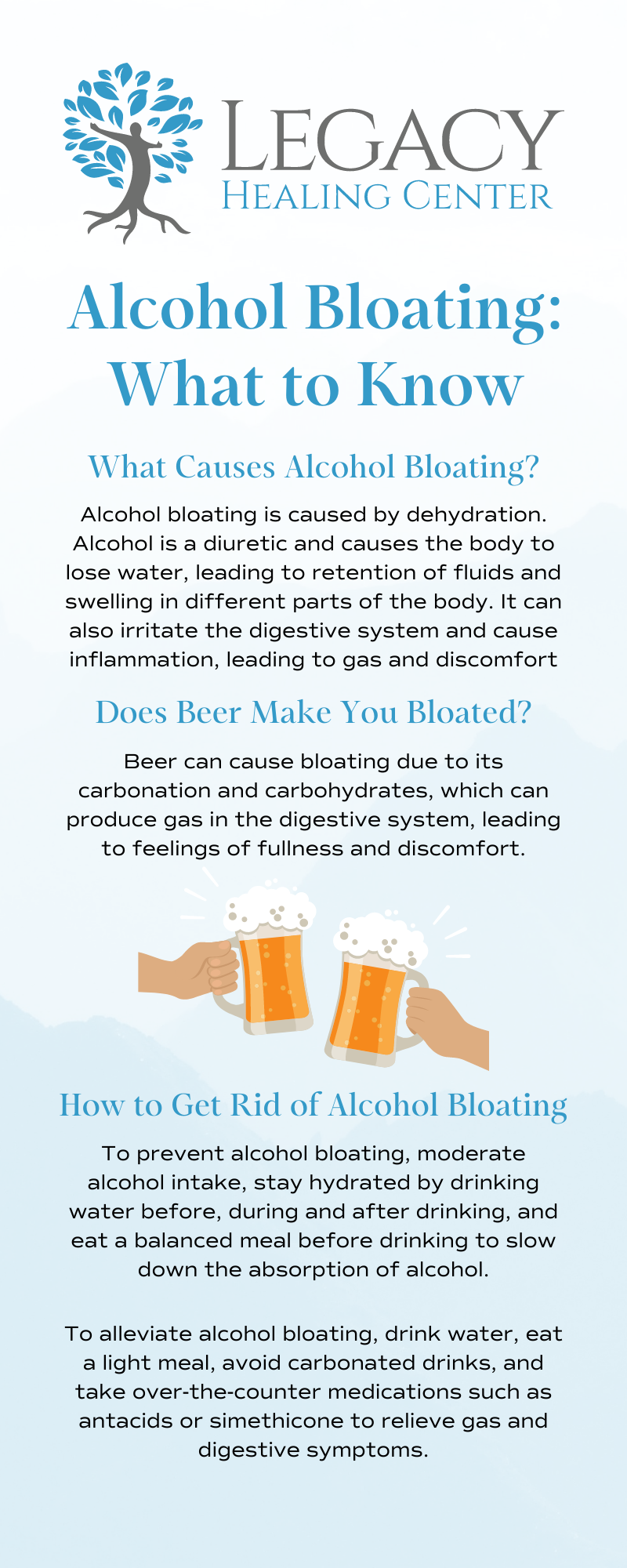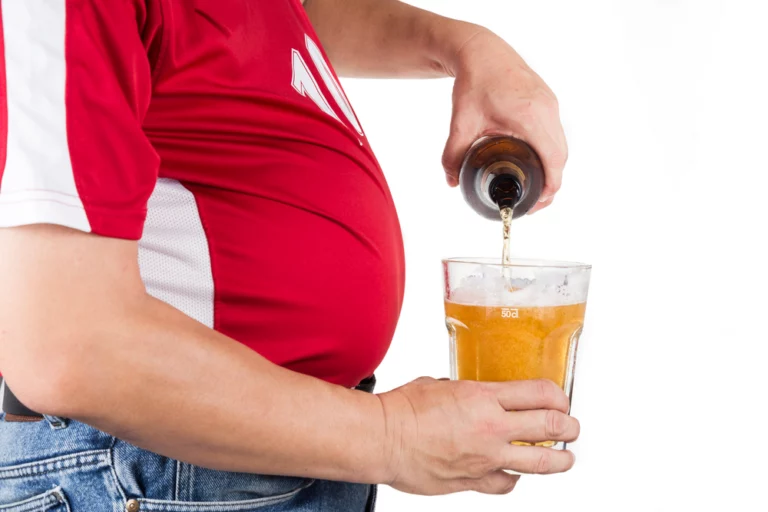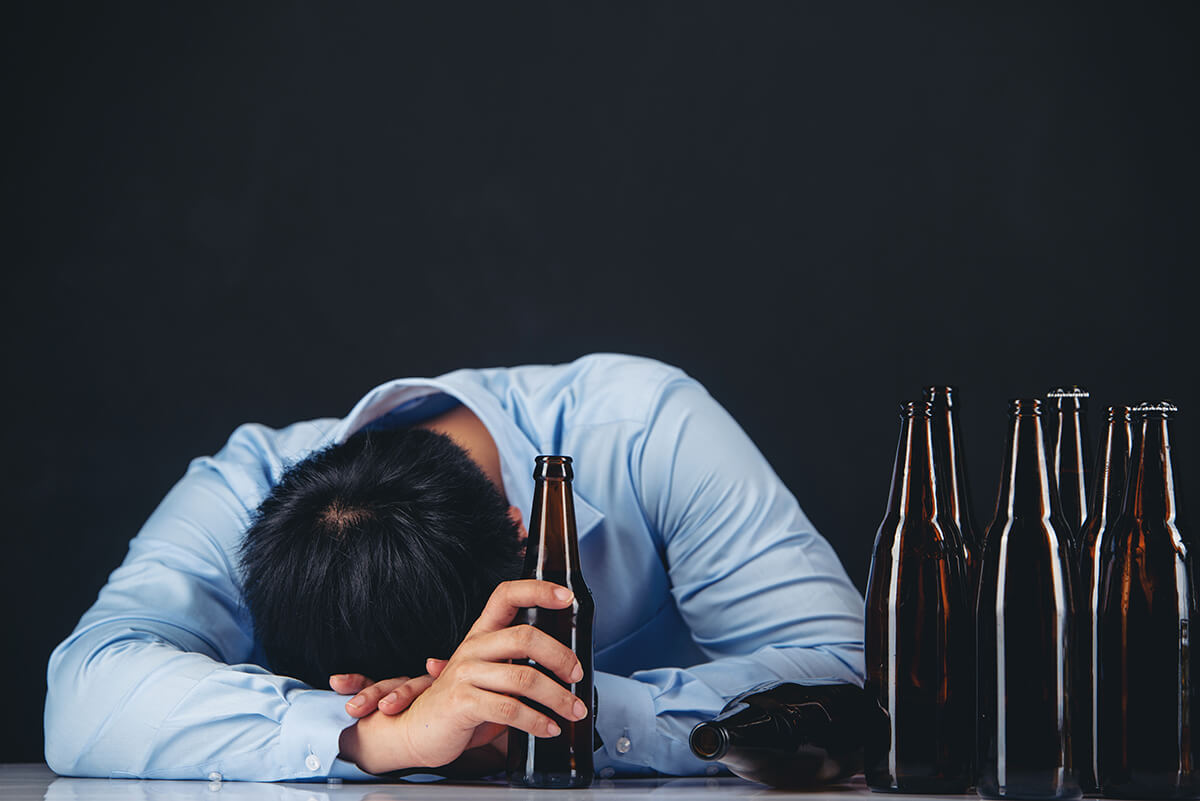Alcohol Bloating and Beer Belly: What to Know
What Is Alcohol Bloating or Beer Belly?
Alcohol bloating is a common side effect of drinking alcohol. It occurs when the body retains excess water due to the dehydrating effects of alcohol, leading to a swollen or puffy appearance in the face, stomach, or limbs. Bloating from alcohol can be uncomfortable and unpleasant, but it can also be a warning sign of more serious health issues. Our rehabilitation center can provide you with the support and help needed to better understand alcohol bloating and addiction to alcohol.
What Causes Beer Belly and Bloating?
Caloric Content of Alcohol
Alcohol is calorie-dense, containing approximately 7 calories per gram—nearly as much as fat. When consumed in large quantities, these “empty calories” can lead to weight gain. Beer, in particular, is rich in carbohydrates and sugars, further contributing to fat accumulation in the abdominal area, commonly known as a beer belly.
Effects of Alcohol on Digestion and Gut Health
Alcohol can disrupt the delicate balance of gut microbiota, leading to inflammation and impaired digestion. It slows down the digestive process, causing food and gas to build up in the gastrointestinal tract, resulting in bloating. Additionally, alcohol irritates the stomach lining, which may worsen symptoms of bloating and discomfort.
Hormonal Changes from Alcohol Consumption
Regular alcohol intake impacts hormone regulation, especially cortisol and insulin. Elevated cortisol levels encourage the storage of visceral fat around the midsection, while disrupted insulin sensitivity leads to an increased likelihood of abdominal fat gain. Together, these hormonal changes contribute to the development of a beer belly and persistent bloating.
How Beer Belly Differs From General Weight Gain
Unique Metabolic Effects of Alcohol
Unlike general weight gain, which is often distributed across the body, alcohol-related weight gain tends to concentrate around the abdomen. This is due to alcohol’s influence on how the body metabolizes fat. When alcohol is present in the bloodstream, the liver prioritizes metabolizing it over other nutrients, delaying the breakdown of fats and leading to their storage, especially in the midsection.
Fat Distribution Patterns in Alcohol Consumers
The “beer belly” phenomenon is tied to visceral fat, which accumulates around internal organs in the abdominal cavity. This type of fat is more metabolically active and associated with higher health risks compared to subcutaneous fat. Men are particularly prone to this pattern due to hormonal factors and a natural tendency to store fat in the abdominal region.
Health Risks Associated With Alcohol-Related Bloating
Long-Term Implications on Liver and Heart Health
Excessive abdominal fat from chronic alcohol consumption increases the risk of serious health conditions. Fat buildup can lead to liver diseases such as fatty liver or cirrhosis. Additionally, visceral fat contributes to cardiovascular issues, including high blood pressure, elevated cholesterol levels, and an increased likelihood of heart disease.
Impact on Physical Appearance and Self-Esteem
Persistent bloating and a beer belly can significantly affect self-image, leading to decreased confidence and self-esteem. This physical manifestation of alcohol consumption often serves as a visual reminder of unhealthy habits, which can create emotional stress and even hinder recovery efforts.
How to Get Rid of Alcohol Bloating
The best way to prevent alcohol bloating is to moderate your alcohol consumption and stay hydrated. Drinking plenty of water before, during, and after drinking alcohol can help counteract the dehydrating effects of alcohol and prevent fluid retention. Eating a balanced meal before drinking can also help slow down the absorption of alcohol and reduce the risk of bloating and other digestive issues.
However, if you do experience alcohol bloating, there are several steps you can take to alleviate the symptoms. Drinking plenty of water, eating a light and balanced meal, and avoiding carbonated drinks can help reduce bloating and discomfort. Over-the-counter medications such as antacids or simethicone can also help relieve gas and other digestive symptoms.
If you are struggling with alcohol addiction or dependence, seeking professional help is the best way to
overcome the negative effects of alcohol on your health and well-being. At Legacy Healing Center, we offer comprehensive alcohol addiction treatment programs that can help you detox from alcohol, manage withdrawal symptoms, and develop the skills and strategies you need to achieve lasting sobriety.
Legacy Healing Center Is Here to Help
Alcohol bloating can be an uncomfortable and unpleasant side effect of drinking, but it can also indicate a more serious underlying issue. By understanding the causes and symptoms of alcohol bloating and taking steps to prevent and treat it, you can protect your health and well-being and avoid the negative effects of alcohol addiction. Additionally, if you are struggling with alcohol abuse or dependence, seeking professional help is the first step towards achieving lasting sobriety and reclaiming your life.
Our Legacy Healing detox centers have the resources necessary to help those struggling with alcoholism navigate withdrawals safely and comfortably. Once this is concluded, patients can expect to be placed in one of our numerous types of addiction treatment programs. From here, they will have access to numerous therapies and programs that aid in healing from the past and preparing for the future.
To take the first steps of healing from alcohol addiction, call Legacy Healing Center today at 888-534-2295 and speak with one of our intake specialists about which treatment option is right for you.
Related Reading
- What Happens if You Drink Alcohol Everyday?
- The Different Types of Alcoholism
- A Guide to Tapering Off of Alcohol





